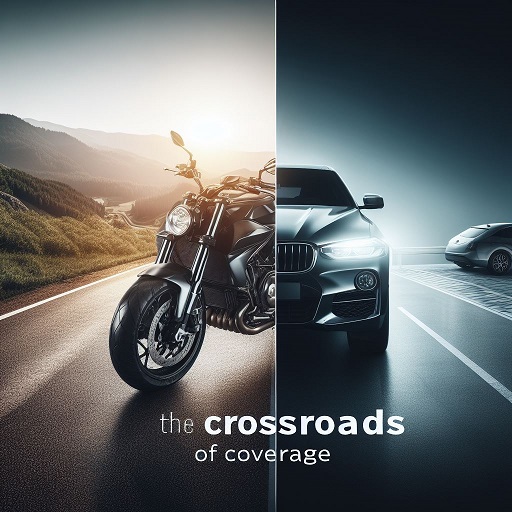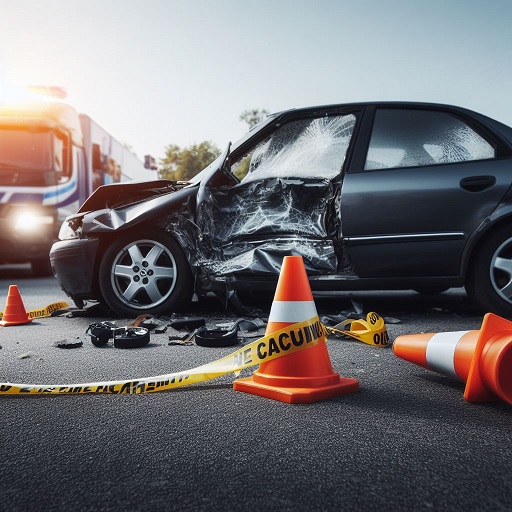Motorcycle accidents can be both physically and financially devastating. If you’re a car owner, you may wonder how a motorcycle accident could impact your car insurance. Will your rates go up? Will your coverage be affected? In this section, we’ll explore how a motorcycle accident can affect your car insurance and what you need to know to navigate the aftermath.

Key Takeaways:
- A motorcycle accident can potentially impact your car insurance coverage and rates.
- The specific implications will depend on your insurance policy, the circumstances of the accident, and your insurer’s policies.
- It’s essential to review your coverage and communicate with your insurer to understand how a motorcycle accident may affect your car insurance.
- Filing a car insurance claim after a motorcycle accident can be complex, but understanding the necessary steps and documentation required can help streamline the process.
- Seeking legal help may be necessary in some situations, so knowing when and how to involve an attorney is crucial.
Car Insurance Coverage After a Motorcycle Accident
When it comes to car insurance coverage after a motorcycle accident, there are a few important factors to consider. First and foremost, it’s essential to understand how your insurer handles claims after a motorcycle accident. Some policies may exclude coverage for motorcycle accidents, which means you will need to take out a separate policy to cover any potential damages or injuries.
To ensure you have adequate coverage, it’s best to review your car insurance policy and speak with your insurer. They can help you understand the terms and conditions of your coverage, and whether any changes need to be made to your policy after a motorcycle accident.
Another aspect to consider is the potential impact on your car insurance rates. After a motorcycle accident, your rates may increase, and insurers will often consider factors such as the severity of the accident, fault determination, and any previous claims history when determining your new rates.
| Tip: | Take proactive steps to mitigate any potential rate increases by driving safely, maintaining a good driving record, and completing any required safety courses or training. |
|---|
It’s also vital to know your car insurance deductible, which is the amount you will need to pay out of pocket before your coverage kicks in. This may be relevant if your car was involved in the accident, as it may affect your deductible amount. Again, reviewing your policy and speaking with your insurer can help you understand any potential implications regarding your deductible.
In summary, understanding your car insurance coverage after a motorcycle accident is crucial for ensuring you have the protection you need. Reviewing your policy, communicating with your insurer, and taking steps to minimize potential rate increases can all help you navigate the aftermath of a motorcycle accident with confidence.
Car Insurance Rates After a Motorcycle Accident
After a motorcycle accident, you may be wondering how it will affect your car insurance rates. Unfortunately, the impact can be significant.
Insurance companies use a variety of factors to determine rates, and one of the most significant is your driving record. A motorcycle accident can result in points on your license or even a license suspension, which can cause your rates to skyrocket.
Additionally, if your car insurance provider also offers motorcycle insurance, they may view you as a higher risk after a motorcycle accident, and your rates for both types of coverage may increase.
It’s important to note that your rates may not increase immediately after the accident. Instead, they may increase gradually over time as your insurance provider reviews your driving record and assigns risk levels to your profile.
Overall, the impact of a motorcycle accident on your car insurance rates can vary widely depending on the severity of the accident, your driving record, and your insurance provider’s policies. Some insurance providers may be more forgiving of motorcycle accidents than others, so it’s important to shop around and compare rates if you’re concerned about the impact on your premiums.
Keep in mind that there are steps you can take to minimize the impact of a motorcycle accident on your car insurance rates. These include taking a defensive driving course, driving safely and avoiding future accidents, and maintaining a good credit score.
If you’re concerned about the impact of a motorcycle accident on your car insurance rates, it’s important to reach out to your insurance provider and discuss your options. They may be able to offer advice or assistance in finding coverage that fits your needs and budget.
Filing a Car Insurance Claim After a Motorcycle Accident
If you’ve been involved in a motorcycle accident, you may need to file a car insurance claim to cover damages to your vehicle. It’s important to act quickly and follow the proper procedures to ensure a smooth claims process.
The first step is to contact your insurance company as soon as possible. Your policy may have specific requirements for reporting accidents, so be sure to review your coverage details beforehand. Provide your insurer with all relevant information, such as the date and location of the accident, the names and contact information of other involved parties, and any police reports or witness statements.
Your insurance provider will likely assign an adjuster to your case, who will evaluate the damage and determine the amount of coverage you’re eligible for. Be prepared to provide additional information or documentation as requested. Once the claim has been processed, your insurer will provide you with a settlement offer that outlines the coverage you’re entitled to.
It’s important to carefully review the settlement offer to ensure that it accurately reflects the damages and expenses related to the accident. You may be able to negotiate with your insurer if you feel that the offer is insufficient or if you have additional expenses that are not included in the offer. However, keep in mind that accepting a settlement offer may impact your ability to pursue legal action in the future.
Overall, filing a car insurance claim after a motorcycle accident can be a complex process. However, by following the proper procedures and communicating effectively with your insurer, you can ensure that you receive the coverage you’re entitled to.
Car Insurance Deductibles and Motorcycle Accidents
When it comes to car insurance after a motorcycle accident, it’s important to understand how your deductible may be affected. A deductible is the amount you’re responsible for paying out of pocket before your insurance coverage kicks in.
In the event of an accident, your insurance company will assess the damages and determine the cost of repairs. Once this cost has been established, you will be responsible for paying your deductible amount. Your insurance company will then cover the remaining cost of the repairs, up to the limits of your policy.
Depending on your policy, your deductible may be different for motorcycle accidents than for car accidents. If you’re unsure about your policy terms, it’s important to review them carefully or contact your insurance agent to confirm.
Keep in mind that if your car is damaged in a motorcycle accident that was caused by another driver, their insurance should cover your damages. In this case, you would not be responsible for paying your deductible.
If you are at fault for the accident, you will be responsible for paying your deductible. However, keep in mind that filing a claim and paying your deductible may also result in an increase in your premiums.
To minimize the impact of a motorcycle accident on your car insurance deductible, consider raising your deductible amount. While this means you’ll pay more out of pocket in the event of an accident, it can also result in lower premiums overall.
Tips for Dealing with Car Insurance After a Motorcycle Accident
Dealing with car insurance after a motorcycle accident can be overwhelming, but you don’t have to go through it alone. Here are some tips to help you navigate the process:
- Communicate with your insurer: It’s crucial to let your insurer know about the accident as soon as possible. Be honest and provide all the required information. This will ensure that your claim is processed quickly and efficiently.
- Review your policy: Take the time to review your policy and understand the coverage you have. Pay attention to any limits or exclusions that may apply to motorcycle accidents.
- Document the accident: Gather as much evidence as possible, such as photos, witness statements, and police reports. This will help support your claim and ensure that you receive the proper compensation.
- Be proactive: Follow up with your insurer regularly to check on the status of your claim and ask any questions you may have. Stay informed and actively participate in the claims process.
Remember, every policy and insurer is unique, and the impact of a motorcycle accident on your car insurance may vary. By staying informed, communicating with your insurer, and documenting the accident, you can navigate the process with confidence and minimize any potential issues.
Seeking Legal Help After a Motorcycle Accident
After a motorcycle accident, you may find yourself dealing with complex legal issues related to your car insurance. Depending on the circumstances surrounding the accident, seeking legal assistance may be beneficial to protect your rights and ensure fair treatment from your insurer
One scenario where legal help may be necessary is if you believe your insurer is acting in bad faith or unfairly denying your claim. If you feel that your claim is being undervalued, delayed, or denied without proper justification, an attorney can help you dispute the decision and pursue a fair outcome.
In some cases, you may also need legal assistance if the other driver involved in the accident disputes fault or if you suffer severe injuries that require extensive medical treatment. An attorney can guide you through the legal process, representing your interests and advocating for fair compensation for any losses you may have experienced.
It’s important to note that involving an attorney may impact your car insurance, as legal action can sometimes lead to higher premiums or even policy cancellation. However, in many cases, the benefits of seeking legal help can outweigh the potential drawbacks, especially if you have significant damages or injuries.
Ultimately, the decision to seek legal help will depend on your specific situation and the advice of your insurance provider. Make sure to carefully review your policy and consult with legal professionals as needed to ensure you fully understand your rights and options after a motorcycle accident.
Conclusion
In conclusion, it’s essential to understand the potential impact of a motorcycle accident on your car insurance. Your coverage, rates, and claims process may be affected, depending on your specific circumstances and policy.
To ensure you’re adequately protected, review your insurance coverage and communicate with your insurer to understand your options. Be proactive in seeking legal help if needed and take steps to minimize the impact on your car insurance rates.
Remember, being informed and prepared can help you navigate the aftermath of a motorcycle accident with confidence. Take the necessary steps to protect yourself and your car insurance coverage.


